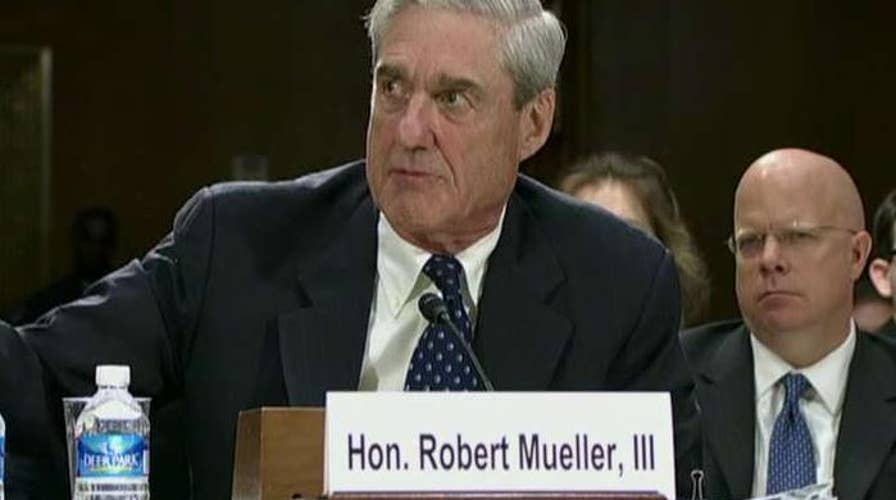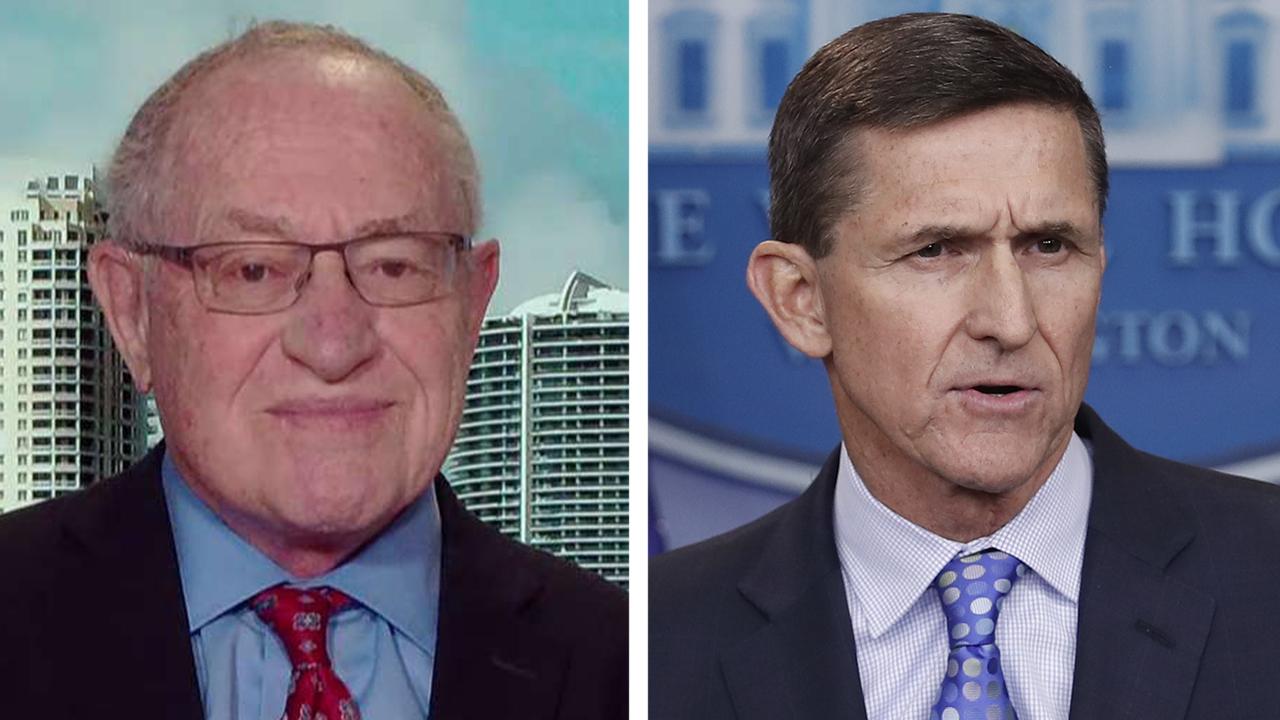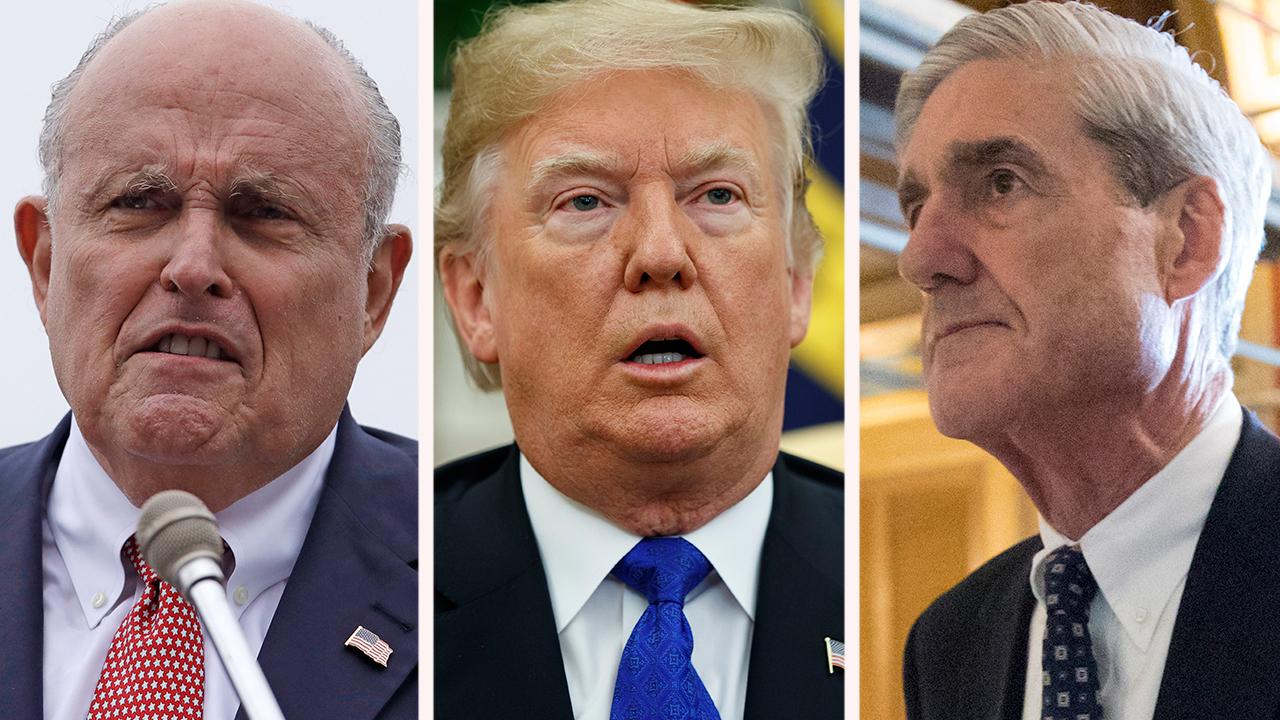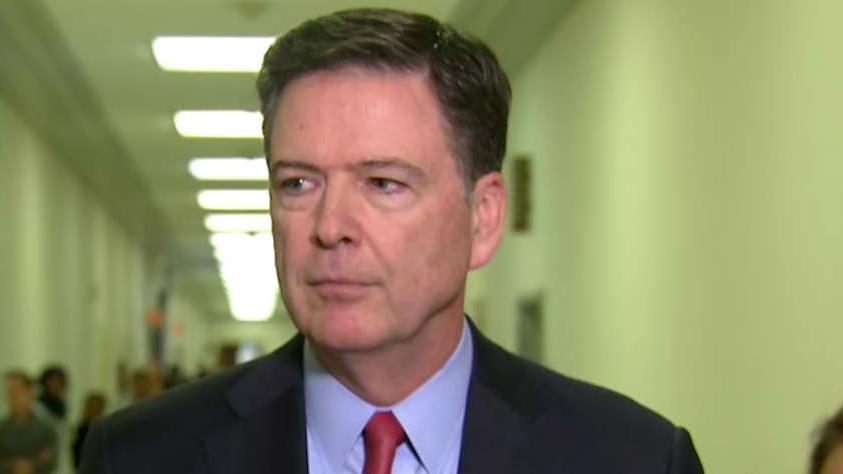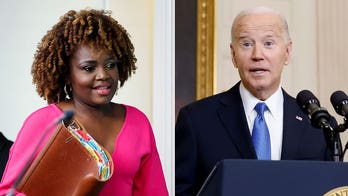Mueller files heavily redacted Flynn 302 interview report
ial counsel files another heavily redacted document in Michael Flynn case; Fox News legal analyst Gregg Jarrett and Fox News contributor Sara Carter react.
Then-National Security Adviser Michael Flynn told FBI agents at the White House on January 24, 2017 "not really" when asked if he had sought to convince Russian ambassador not to escalate a brewing fight with the U.S. over sanctions imposed by the Obama administration, according to an explosive new FD-302 witness report released just hours before Flynn is set to be sentenced.
Flynn issued other apparently equivocal responses to FBI agents' questions, and at various points suggested that such conversations might have happened or that he could not recall them if they did, according to the 302.
The heavily redacted document contained few definitive statements from Flynn, who later pleaded guilty to making false statements about his contacts with Russia's ambassador, in connection with the White House meeting.
Flynn was not charged with wrongdoing as a result of the substance of his calls with the Russian ambassador -- and a Washington Post article published one day before his White House interview with the agents, citing FBI sources, publicly revealed that the FBI had wiretapped Flynn's calls and cleared him of any criminal conduct.
ANTI-TRUMP FBI AGENT PETER STRZOK, WHO INTERVIEWED FLYNN, HAD 'MEDIA LEAK STRATEGY'
The 302 indicates that Flynn was apparently aware his communications had been monitored, and at several points he thanks the FBI agents for reminding him of some of his conversations with Russian officials.
Separately, a newly unsealed indictment Monday revealed that two Flynn associates had been charged with illegally lobbying for Turkey without properly registering under the Foreign Agent Registration Act (FARA), and Mueller has claimed Flynn also lied about his lobbying projects there. Flynn's guilty plea and cooperation with the Mueller probe helped him avoid similar FARA-related charges, legal analysts have said.
The newly released 302 was finalized on Feb. 15, 2017 after it was reviewed by top FBI brass, just two days following Flynn's resignation after he misled Vice President Pence about his communications with then-Russian ambassador Sergey Kislyak.
The document stated that Flynn told agents "not really" and "I don't remember" when they asked if he had requested Kislyak and the Russians not engage in a "tit-for-tat" with the U.S. government over the Obama administration's sanctions in December 2016, or whether he had asked the Russians not to "escalate" the matter and to keep their response "reciprocal." (Trump, at the time, publicly said he wanted the U.S. to "move on" and not engage in a bitter dispute with Russia.)
Flynn -- who sold his home in Virginia this year as his legal bills mounted -- declared in his guilty plea nearly 11 months later that his comments on the issue were a knowing lie to the FBI agents.
"It wasn't, 'Don't do anything,'" Flynn told the agents when they asked him if he had requested that the Russian ambassador not retaliate against the U.S., according to the 302. Flynn intimated that the U.S. government's harsh sanctions came as a "total surprise" to him, the document states.
Separately, agents asked Flynn whether Kislyak had promised that Russia would "modulate" its response to the sanctions, which were imposed by the Obama administration in its final days in power in response to Russian election meddling.
TOP REPUBLICAN PREDICTS FLYNN GUILTY PLEA WILL BE TOSSED, CITING FBI 'MISCONDUCT'
"Flynn stated it was possible that he talked to Kislyak on the issue," the 302 stated, "but if he did, he did not remember doing so. Flynn stated he was attempting to start a good relationship with Kislyak moving forward."
The 302 continued: "Flynn remembered making four to five calls that day about this issue, but that the Dominican Republic [where he was vacationing] was a difficult place to make a call as he kept having connectivity issues. Flynn reflected and stated that he did not think he would have had a conversation with Kislyak about the matter, as he did not know the expulsions [of 35 Russian diplomats from the U.S. as part of the Obama administration's sanctions] were coming."
An entire paragraph of the 302 concerning a "closed-door meeting" between Flynn and Kislyak after the presidential election was redacted.
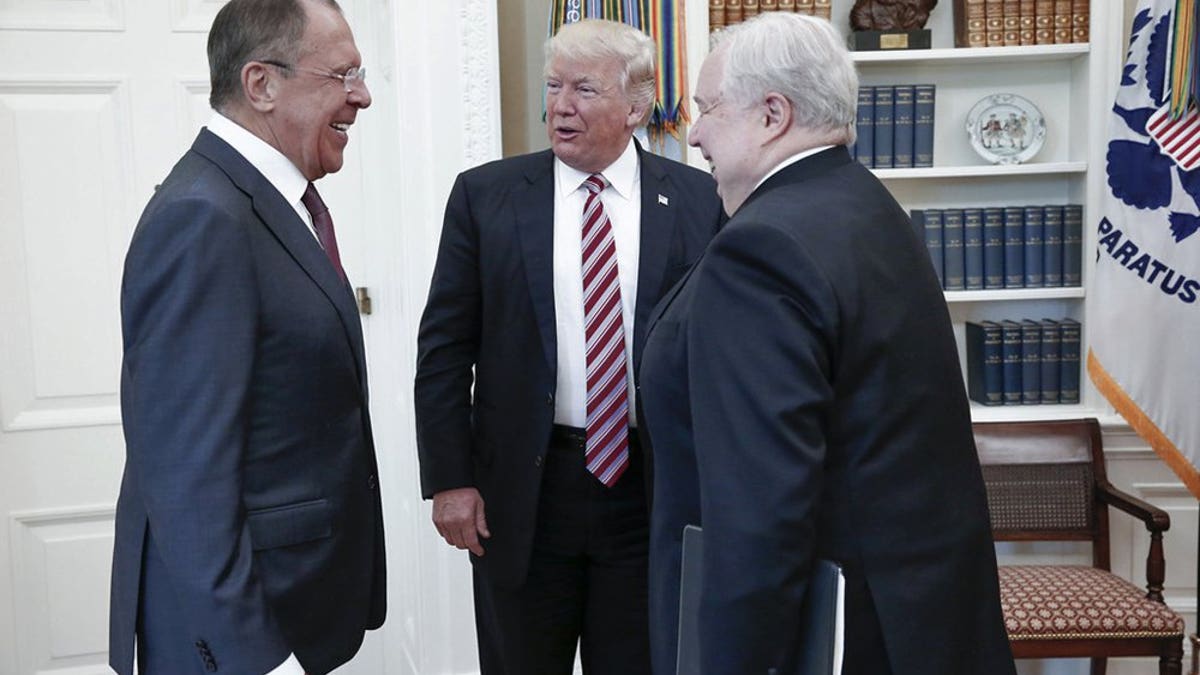
Russian ambassador Sergey Kislyak, at right, meets with President Trump and Russian Foreign Minister Sergey Lavrov. The May 10, 2017 meeting took place the same day Trump fired James Comey as FBI Director. Trump was widely criticized during the meeting for revealing information to the Russians about intelligence obtained from Israel about an ISIS terror plot involving laptop bombs. Although the president has the authority to disclose classified information, critics charged the move was reckless and endangered Israeli sources. (AP)
The document concluded by noting that "Flynn stated he did not have a long drawn out discussion with Kislyak where he would have asked him to 'don't do something.'"
Flynn, in fact, had asked Kislyak to "refrain from escalating the situation in response to sanctions that the United States had imposed on Russia that same day," according to prosecutors, who said Kislyak "had chosen to moderate its response to those sanctions as a result of his request."
Flynn also denied to investigators that he had asked Russia to vote in any particular way at the United Nations, saying his only calls to countries were requests for information as to how they planned to vote. But prosecutors said that Flynn had sought to convince Russia to veto a U.N. Security Council resolution that condemned Israel’s settlements in the West Bank. (The Obama administration abstained in that vote, which Republicans characterized as a betrayal of a close U.S. ally.)
Prosecutors addititonally charged that a "very senior member” of the Trump transition team directed Flynn to contact foreign governments including Russia over the U.N. vote. The Associated Press reported the “very senior” official was Trump son-in-law Jared Kushner.
During the interview at the White House, Flynn twice thanked agents for reminding him about his contacts with Kislyak concerning the U.N. -- an apparent indication that he was well aware that the FBI, as The Post reported, had listened to his conversations. ("Yes, good reminder," he said at one point, according to the 302.)
Special Counsel Robert Mueller filed the witness report documenting FBI agents' fateful conversation with Flynn late Monday, shortly after U.S. District Judge Emmet G. Sullivan issued an order Monday requiring that prosecutors publicly turn over the document.
Sullivan had ordered the special counsel to turn over all government documents and “memoranda” related to the questioning of Flynn last week, after Flynn's attorneys, in a bombshell filing, claimed the FBI had discouraged him from bringing a lawyer to the White House interview and intentionally decided not to warn him of the consequences if he lied to agents.
Fired FBI Director James Comey admitted last week that the FBI's end-run around the White House Counsel -- which the FBI usually involves in any of its interviews with senior White House officials -- was not normal protocol, and that the FBI felt it could get "away with" the tactic in the early days of the Trump administration.
COMEY: WE GOT 'AWAY WITH' FLYNN INTERVIEW, BROKE PROTOCOL
Last Friday, Mueller met Sullivan’s deadline and provided some documents, some of which were heavily redacted. One memorandum produced by Mueller substantiated the claims by Flynn's lawyers that the FBI had cautioned Flynn against involving a lawyer in the interview because doing so would necessitate the Justice Department's involvement.
The memorandum, written by then-Deputy FBI Director Andrew McCabe, also confirmed that agents did not want to affect their "rapport" with Flynn by suggesting he would be exposed to criminal liability if he lied.
"I explained that I thought the quickest way to get this done was to have a conversation between [Flynn] and the agents only," McCabe wrote. "I further stated that if LTG Flynn wished to include anyone else in the meeting, like the White House Counsel for instance, that I would need to involve the Department of Justice. [General Flynn] stated that this would not be necessary and agreed to meet with the agents without any additional participants."
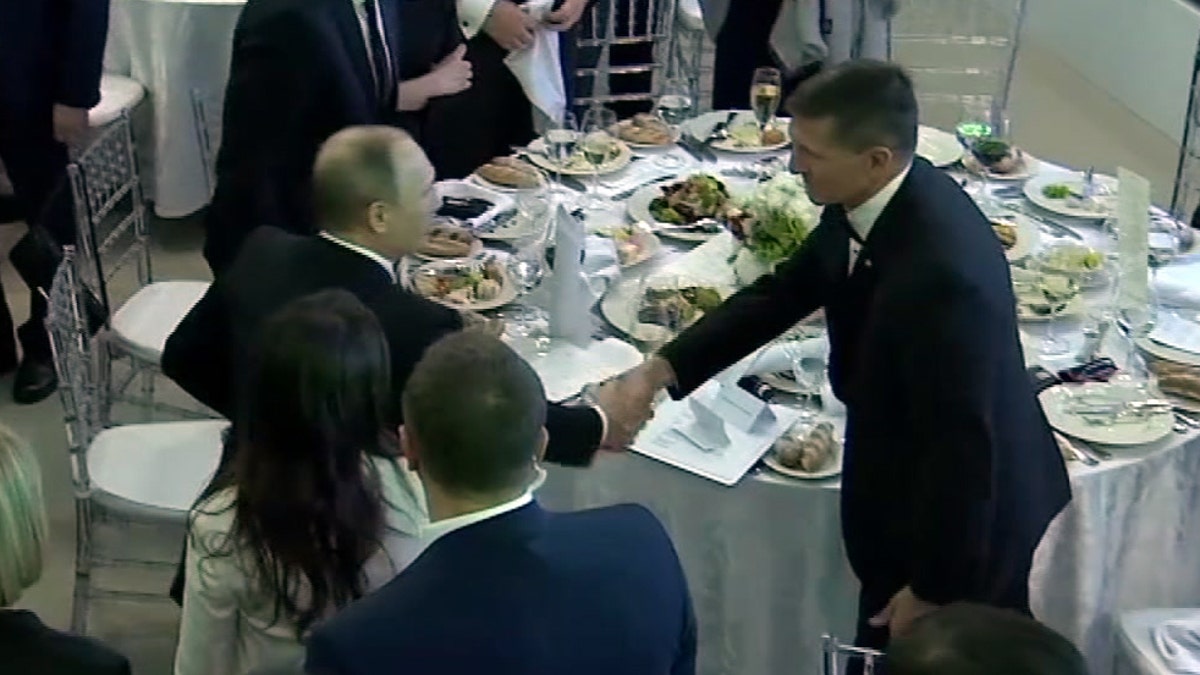
In this image made from a video taken on Dec. 10, 2015 and made available on Tuesday, Feb. 14, 2017, US President Donald Trump's former National Security Advisor Michael Flynn, right, shakes hands with Russian President Vladimir Putin, in Moscow. (Ruptly via AP) (The Associated Press)
However, the special counsel did not publicly provide the January 302 witness report that FBI policy dictated should have been written immediately after the Flynn interview, leading to speculation as to whether one was drafted.
Sullivan's order on Monday stated that Mueller's team had made confidential arguments under seal as to redactions it would need to make to the 302. Sullivan ruled that the redactions were appropriate and that due to "strong presumption in favor of public access to judicial records," the 302 could be made public Monday.
STRZOK'S PHONE COMPLETELY WIPED AFTER HE WAS FIRED BY MUELLER FOR ANTI-TRUMP BIAS
The Flynn 302 released Monday further claimed Flynn was advised about the "nature of the interview" before it began.
However, the McCabe memorandum released Friday apparently showed that the FBI nudged Flynn not to have an attorney present during the questioning. And FBI agents deliberately did not instruct Flynn that any false statements he made could constitute a crime, and decided not to "confront" him directly about anything he said that contradicted their knowledge of his wiretapped communications with Kislyak.
One of the agents who conducted the Flynn interview, Peter Strzok, was fired from the Russia probe in late July 2017 over his apparent anti-Trump bias.
Other portions of the document described apparently routine calls between Flynn and Kislyak about other matters.
On Sunday, GOP Rep. Devin Nunes told Fox News' "Sunday Morning Futures" it was likely Flynn pleaded guilty only because of overwhelming financial pressure and because "he was just out of money."
California Republican Rep. Darrell Issa, for his part, told host Maria Bartiromo that he "would not be surprised a bit if the conviction of Flynn is overturned, because of the Justice Department and FBI's misconduct."
In June, Freedom Caucus Chair Rep. Mark Meadows, R-N.C, charged that the FBI may have "edited and changed" key witness reports in the Hillary Clinton and Russia investigations. Meadows also raised the possibility that the FBI misled the Department of Justice watchdog in an attempt to hide the identities of FBI employees who were caught sending anti-Trump messages along with Strzok.
Speaking separately to "Fox News Sunday," Trump attorney Rudy Giuliani flatly charged that Flynn had been "railroaded" and "framed."
"What they did to General Flynn should result in discipline," Giuliani told host Chris Wallace. "They’re the ones who are violating the law.
Giuliani acknowledged that Flynn had misled Pence regarding his conversations with the then-Russian ambassador, but added, "that was a lie, but that’s not a crime."
